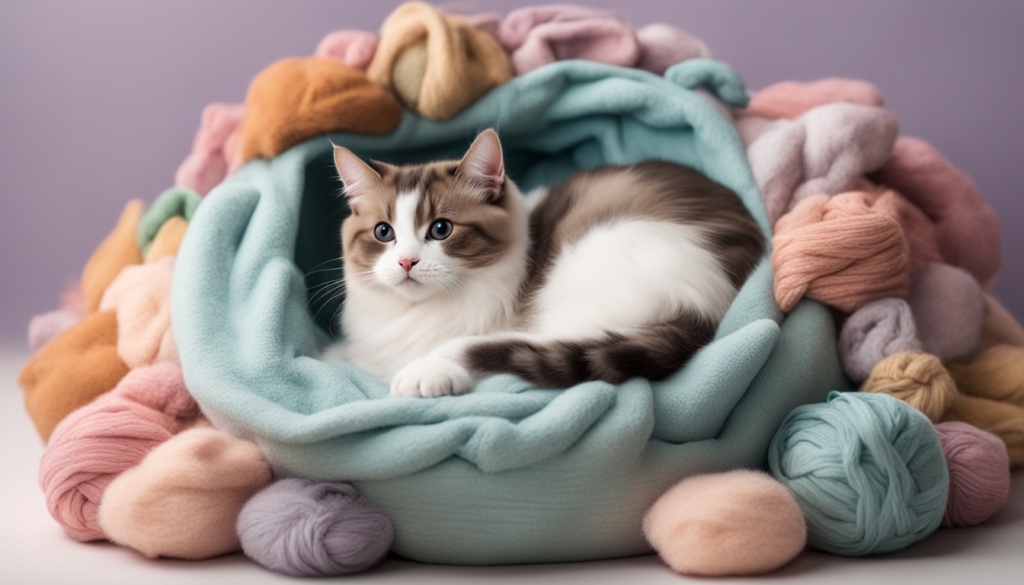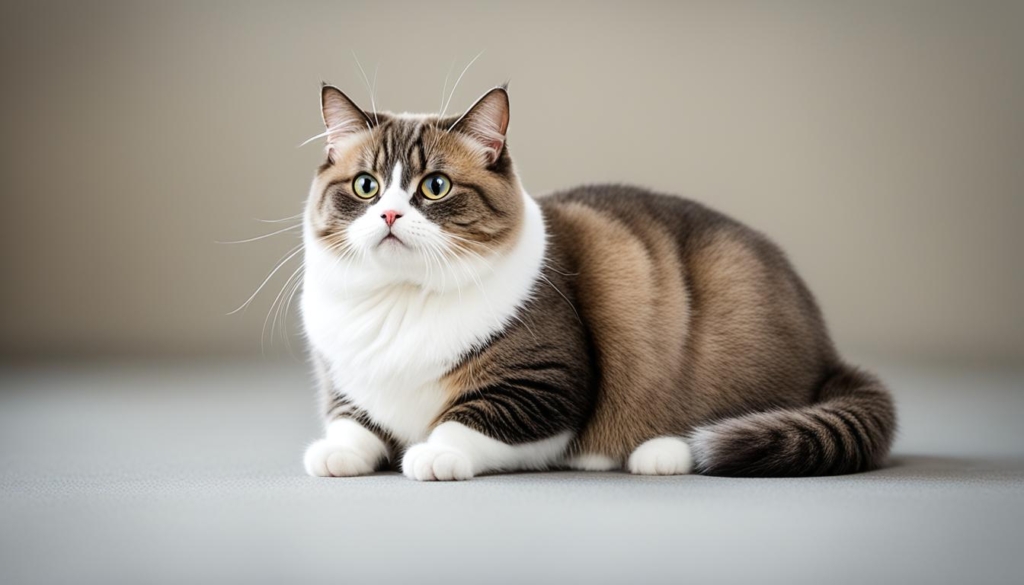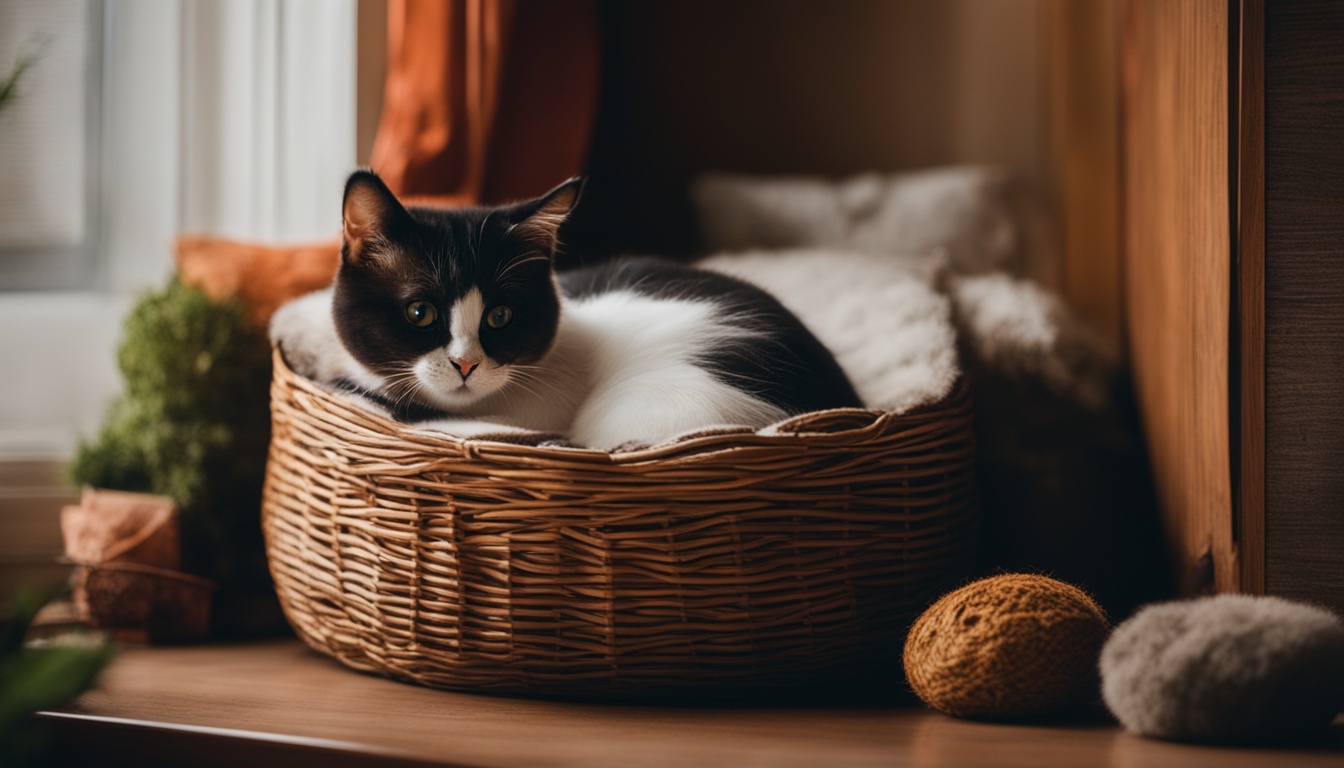The average pregnancy for Munchkin cats is about 60 to 65 days. Finding the exact due date can be hard if you don’t know when they mated. Cats can get pregnant at just 4 months old. But, it’s best to wait until the mother is fully grown before breeding. This ensures the health and well-being of the Munchkin cat and her kittens.
Key Takeaways
- Munchkin cat pregnancies last around 60-65 days on average.
- Cats can get pregnant as young as 4 months old, but responsible breeders wait until the mother is mature.
- Carefully timing and monitoring Munchkin cat pregnancies is important for the health of the mother and kittens.
- Responsible breeding practices are crucial for the Munchkin breed due to potential genetic concerns.
- Understanding the Munchkin cat pregnancy timeline can help ensure proper care and support during this critical time.
Introduction to Munchkin Cat Pregnancy
Munchkin cats are known for their short legs, but their pregnancy is like any other domestic cat’s. It’s important for owners and breeders to know the signs, timeline, and care needed during a Munchkin cat’s pregnancy. This guide will cover everything from the gestation period to caring for the kittens after birth.
Munchkin cats usually weigh 6 to 9 pounds and live 12 to 15 years. They are playful, energetic, and known for their unique short legs. These legs are about 3 inches shorter than most cats. Munchkin cats come in various coat colors and patterns, like tabby, calico, gray, and solid black.
These cats can easily gain weight because of their short legs. To breed Munchkin cats, you must mate one with a non-Munchkin cat. Breeding two Munchkin cats can lead to a quarter of the litter not surviving. This has sparked debate about breeding Munchkin cats, as it involves intentionally passing on short legs.
“The Guinness World Records recognized a Munchkin cat named Lilieput as the shortest living cat on record at 13.34 cm (5.25 in) in 2013.”
The first Munchkin cats were found in the US in 1964, but breeding started in 1983. Two pregnant Munchkin cats were found then. The breed was introduced to the public in 1991 at a cat show by the International Cat Association.
Munchkin kittens can have a rare spinal condition called Lordosis. This affects the spine and muscles, making breathing and heart function hard. It’s important to understand these challenges to ensure the health of the mother and kittens.
The Munchkin Cat Breed and Pregnancy
The Munchkin cat is known for its short legs, thanks to a genetic mutation. This trait has won over many cat lovers. However, it also brings up worries about health during pregnancy and birth. Breeders must focus on the mother and kittens’ health to avoid any harm.
Concerns About Munchkin Cat Breeding
When two Munchkin cats mate, they often have small litters. This suggests the short-leg gene might be deadly early on. Studies show Munchkin cats can have limb problems and joint health issues. More research is needed to understand these effects fully.
Some reports talk about lordosis and pectus excavatum in Munchkins. But, there’s not much solid research on these topics yet. Because of these health worries, breeding Munchkin cats is a debated topic.
Importance of Responsible Breeding
Responsible breeders must look out for the mother and kittens during breeding. They should watch closely when breeding short-legged Munchkins. This helps avoid health problems for the breed.
Dwarf cats, like Munchkins, might have pregnancy and birth challenges because of their size. Sometimes, they need a cesarean section to be safe. Breeders must be ready to give the medical care needed for a healthy pregnancy and birth.
By breeding responsibly, Munchkin cat fans can help keep the breed healthy and address ethical concerns. This way, they can enjoy these unique cats while ensuring their well-being.
Signs of Pregnancy in Munchkin Cats
Munchkin cats show clear signs of pregnancy that owners should watch for. The first sign is the pinking-up or getting bigger and redder of the nipples, starting around the 2-week mark. Owners might also see morning sickness and a slow weight gain in their cat early on.
Early Signs of Pregnancy
- Enlarged and reddened nipples (pinking-up)
- Morning sickness
- Gradual weight gain
Physical Changes During Pregnancy
As the pregnancy goes on, the Munchkin cat’s belly will get bigger. Owners will also see fur loss and more grooming. These changes show the cat is getting ready for her kittens.
- Swelling abdomen
- Fur loss
- Increased grooming
“My 10-month-old Munchkin cat is pregnant, and I’ve been amazed by how well she’s handling it. Despite her small size, she’s giving birth without any complications.”

Owners of pregnant Munchkin cats should watch their cats closely. Keeping an eye on them can help spot and fix any issues during pregnancy and birth. Knowing the signs of pregnancy in Munchkin cats helps owners give their cats the care they need during this special time.
How Long Are Munchkin Cats Pregnant?
Munchkin cats are pregnant for about 63 to 65 days. This is a bit shorter than the usual time for other domestic cats, which is between 63 to 67 days.
The Munchkin breed was first shown by The International Cat Association (TICA) in 1991. They became a full part of TICA’s registry in 2002. In 2003, they got Championship status, showing they are well-rounded in looks, behavior, and more.
To keep the breed healthy, Munchkin cats are bred with other cats that don’t have the short legs gene. This keeps the breed’s health and genetic variety strong.
- Munchkin cats have a gestation period of around 63 to 65 days
- The breed was officially recognized by TICA in 1991 and 2002
- Munchkin cats received Championship status from TICA in 2003
- Breeding involves outcrossing to maintain health and diversity
Even though they are small, Munchkin cats are mostly healthy. They might face some bone issues or chest problems. But, their short legs can make them more likely to get osteoarthritis.
“Munchkin cats have a lifespan of about 12 to 15 years, which is comparable to some mixed breed cats’ lifespan of 15 to 20 years.”
It’s crucial to breed Munchkin cats responsibly for their health and happiness. Knowing about their pregnancy and gestation helps owners and breeders care for these cute cats well.
Caring for a Pregnant Munchkin Cat
Caring for a pregnant Munchkin cat means paying close attention to their diet and health. As they carry their kittens, they need extra support to stay healthy. It’s important to make sure they get the care they need for a healthy pregnancy.
Nutritional Requirements
A pregnant Munchkin cat needs more nutrients for her kittens. You should feed her a high-quality kitten food full of important nutrients. Also, increase her food by about 50% to help her meet her increased needs.
Vet Check-ups and Prenatal Care
Seeing the vet regularly is key for a healthy pregnancy in Munchkin cats. Your vet can check on the mom and kittens, offer advice, and help with any health issues. They might do ultrasounds, weight checks, and health assessments to keep everything going smoothly.
By giving your Munchkin cat the right nutritional requirements and prenatal care, you help her have a healthy pregnancy. With the right support, these lovely cats can easily go through the joys of being parents.
Munchkin Cat Pregnancy Timeline
Munchkin cats, with their short legs, have a pregnancy timeline similar to other cats. It lasts about 60-65 days. This time includes many changes for the mother and her kittens, getting ready for birth.
Week-by-Week Breakdown
In the first weeks, a Munchkin cat’s pregnancy signs are subtle. You might notice more affection, changes in eating, and a bit of weight gain. As time goes on, the mom’s belly will grow, and she might want quiet places to rest.
By the fourth week, the kittens start to show their short legs. The mom’s nipples will also get bigger, showing the kittens are coming soon. Near the end, the mom’s belly gets really big, and she might act uncomfortable or restless as the kittens get ready to be born.
- Weeks 1-2: Subtle changes, such as increased affection and appetite changes.
- Weeks 3-4: Gradual abdominal expansion, kittens develop short legs, and mammary glands swell.
- Weeks 5-8: Significant abdominal growth, mother may become more reclusive, and signs of discomfort may appear.
- Weeks 9-10: Mother enters the final stages of pregnancy, preparing for labor and delivery.
Watching a Munchkin cat during pregnancy is important. Regular vet visits help keep the mom and kittens healthy. Knowing what to expect each week helps owners give the best care during this time.
Preparing for the Munchkin Cat’s Labor and Delivery
As your Munchkin cat’s due date nears, it’s key to set up a quiet spot for her to have her babies. Start this around the 7th week of pregnancy. This lets your cat get used to the nesting box. The box should be in a warm spot with little foot traffic. Use soft, shredded materials to line it, making a safe place for the mom and kittens.
Setting Up a Munchkin Cat Nesting Box
Here are some tips for setting up a nesting box for your pregnant Munchkin cat:
- Pick a strong, enclosed box with high sides to keep the kittens safe.
- Use soft, absorbent materials like shredded newspaper, towels, or safe cat bedding.
- The box should be big enough for the mom to move easily but not too big to make her feel uneasy.
- Put the nesting box in a quiet spot away from loud noises.
- Let your cat get used to the nesting box before the due date.
Creating a cozy and safe space helps your Munchkin cat and her kittens have a smooth labor and delivery.
Post-Birth Care for Munchkin Cat and Kittens
After the Munchkin cat gives birth, she will take care of her kittens on her own. She will keep them warm, groom them, and feed them. It’s important not to disturb this unless the mother is not caring for the kittens properly.
The kittens should nurse and bond with their mother with little human help. This helps them start their lives off right.
In the first few days, the Munchkin cat mother will keep her kittens close. She will clean and nurse them often. It’s key to watch how the kittens are gaining weight. If a kitten isn’t gaining weight or seems sick, see a vet right away.
As the kittens get older, the mother will start to feed them solid food. She will also teach them how to groom and use the litter box. Make sure they have a clean, quiet place to live.
It’s important to take the Munchkin cat and her kittens to the vet regularly. The vet can check they’re healthy and give advice on post-birth care for Munchkin cat and kittens. This includes when to get vaccines, deworming, and any other medical care they might need.
By giving the Munchkin cat and her kittens the right care after birth, they can have a smooth start to life. Always talk to a vet if you have any worries or questions about their health.
Potential Complications in Munchkin Cat Pregnancies
Munchkin cat pregnancies usually go smoothly, but there are risks because of their unique size. Owners and breeders need to watch the cat’s health closely. They should get vet help quickly if they notice any problems.
Osteoarthritis is a risk for Munchkin cats because of their short legs. It gets worse as they get older. Some Munchkin cats might be born with pectus excavatum, a chest problem. This might need surgery if it’s bad.
Lordosis, a spinal curve, can cause pain and make it hard for Munchkin cats to move. Breeders should check for this and fix it to keep the cats healthy.
Other health issues can happen during pregnancy, like hyperthyroidism, feline lower urinary tract disease, heart disease, and diabetes. It’s important to catch and treat these to keep the mom and kittens healthy.
Good breeding practices, regular vet visits, and watching the cats closely are key to avoiding problems with Munchkin cat pregnancies. By focusing on the cat’s health, breeders can make sure the pregnancy and birth are safe and successful.

Conclusion
Munchkin cat pregnancies last about the same as other cats, from 60 to 65 days. It’s important to take good care of the mom and kittens. This means giving them the right food, watching their health, and making sure they are happy.
Munchkin cats are known for being friendly and loving their families. They were first seen in the 1980s in the United States. The International Cat Association recognized them in 1994, and they got official status in 1995. These cats can live between 12 to 15 years, making them great companions for a long time.
It’s key to take Munchkin cats to the vet regularly and feed them well, before and after they have kittens. By doing this, we can help Munchkin cat pregnancies and the kittens grow strong and healthy.


